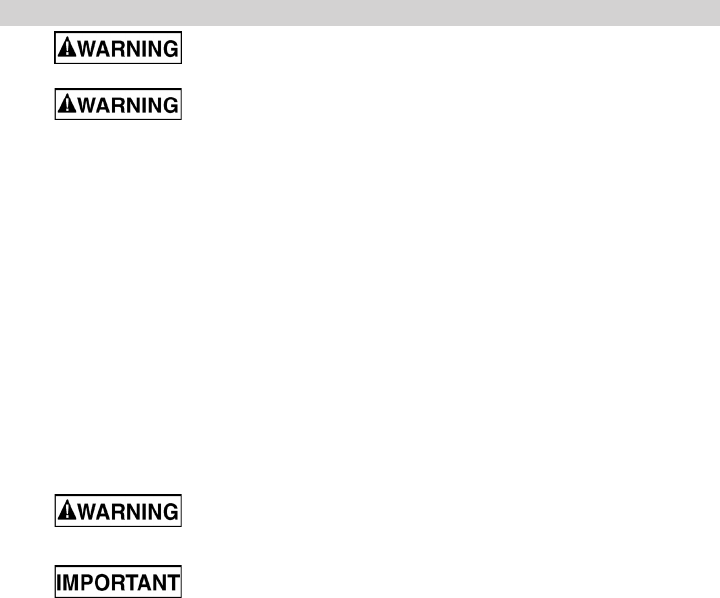
• 6 •
20A Rapid and 55A Boost Charge Rate• – Use for charging automotive, marine and
deep-cycle batteries. Not intended for industrial applications.
140A Engine Start• – Provides 140 amps for cranking an engine with a weak or run
down battery. Always use in combination with a battery.
OPERATING INSTRUCTIONS11.
This battery charger must be properly assembled in accordance with
the assembly instructions before it is used.
This is a manual charger. Be sure to monitor the charging process and
stop it when the battery is charged. Not doing so may cause damage to your battery or
result in other property damage or personal injury.
Charging
Ensure that all of the charger components are in place and in good working 1.
condition, for example, the plastic boots on the battery clips.
Connect the battery following the precautions listed in sections 6 and 7.2.
Connect the AC power following the precautions listed in section 8.3.
Select the appropriate settings for your battery.4.
Turn the charger on.5.
Manual Charging Mode
When a manual charge is performed, the charger will continue to charge and will not
shut off. You must keep a visual check on the ammeter to determine when the battery
is charged. Be sure to monitor the charging process and stop it when the battery is
charged. Not doing so may cause damage to your battery or result in other property
damage or personal injury.
Using the Engine Start feature
Your battery charger can be used to jumpstart your car if the battery is low. Follow these
instructions on how to use the ENGINE START feature.
Follow all safety instructions and precautions for charging your battery.
Wear complete eye protection and clothing protection. Charge your battery in a well-
ventilated area.
Using the ENGINE START feature WITHOUT a battery installed in
the vehicle could cause damage to the vehicle’s electrical system. NOTE: If you have
charged the battery and it still will not start your car, do not use the engine start feature,
or it could damage the vehicle’s electrical system.
Set switch #2 to the OFF position.1.
With the charger unplugged from the AC outlet, connect the charger to the battery 2.
following the instructions given in section 6 (FOLLOW THESE STEPS WHEN THE
BATTERY IS INSTALLED IN A VEHICLE).
Plug the charger AC power cord into the AC outlet.3.
With the charger plugged in and connected to the battery of the vehicle, set switch 4.
#1 to the engine start position, and set switch #2 to the down position.
Crank the engine until it starts or 3 seconds pass. If the engine does not start, wait 6 5.
minutes before cranking again. This allows the charger and battery to cool down.
NOTE: During extremely cold weather, or if the battery is under 2 volts, charge the
battery for 5 minutes before cranking the engine.
If the engine fails to start, charge the battery for 5 more minutes before attempting to 6.
crank the engine again.
After the engine starts, move switch #2 to the OFF position and unplug the AC power 7.
cord before disconnecting the battery clips from the vehicle.
Clean and store the charger in a dry location.8.
NOTE: If the engine does turn over but never starts, there is not a problem with the
starting system; there is a problem somewhere else with the vehicle. STOP cranking the
engine until the other problem has been diagnosed and corrected.















